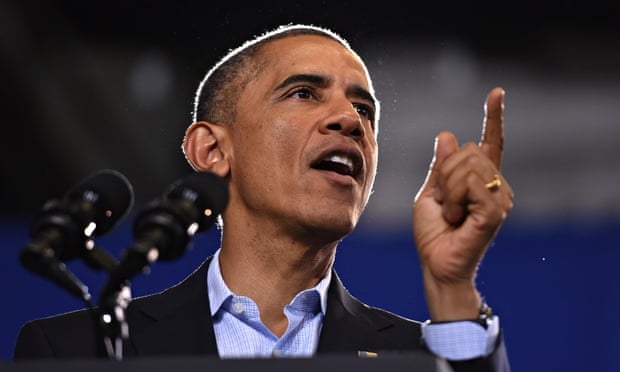The Guardian view on Barack Obama’s midterms defeat: he must try harder
The president faces a hostile legislature, and working with it will not be easy. But the world cannot afford for him to drift into lethargy. He must pick up the pieces and lead

The results of the US midterms have been a clear blow to Barack Obama. It is true that midterm elections are rarely a pleasant experience for any president, and Mr Obama had already lost a majority in the House of Representatives in 2010. He also took care to manage expectations – reportedly remarking that his party was defending its most difficult set of seats since the Eisenhower era. But Tuesday’s vote comes across as a watershed for a US president who staked so much, since his election in 2008, on a message of hope and change for his country and the wider world.
The Democrats have been shattered. They come out even weaker in the House of Representatives, as well as losing the seven Senate seats that have handed the Republicans a comfortable majority of at least 52-48. For his last two years in office, Mr Obama is now faced with a fully Republican-dominated Congress. Things are made worse by the fact that the campaign has often resembled a referendum on Mr Obama as a person. The dominant Republican narrative has been to reignite attacks on his personality and his leadership style, not just his policies. Mr Obama’s open frustration at being sidelined by Democratic candidates as they campaigned (he only travelled to five states) has testified to his damaged image, a mixture of aloofness and a lost capacity to inspire. Carefully thought-out, beautifully written speeches seem to have lost their once-magical power.
He has reason to feel aggrieved. Judging by the issue the voters generally care about most – the economy – Mr Obama’s prospects should have looked far better. Unemployment has fallen under 6%. GDP growth has picked up, reaching an annualised 3.5% between July and September. Mr Obama can claim that, with the help of the shale gas revolution, he has pulled the country out of recession. But somehow the voters declined to give him much credit. It did not help that the low turnout figure of 40% reflected a lack of mobilisation of women and Hispanic voters, the backbone of Mr Obama’s re-election success in 2012. Hillary Clinton will no doubt be on the lookout for the lessons to be drawn, in her bid for 2016.
Advertisement
What should a prospectively lame-duck president do next? He will promise to reach out and foster bipartisanship in an effort to push through issues of common interest with the Republicans. The new Senate leader insists he will be responsive, though the record induces scepticism. Still, free trade agreements are one area where there is at least potential for real cooperation, and in a field that Europe will want to follow closely. Immigration reform could also bring minds together, although the polarisation of American politics makes that more of a hope than a certainty. Overall, Republicans will have to decide whether they want to prioritise concrete achievements over permanent intransigence and sabotage.
The president may well resort to wielding his veto, or using that other powerful tool of presidential authority, executive orders. But these instruments only go so far and could increase divisiveness. Salvaging Obamacare will require more than arm-wrestling. In this new American political landscape, what the US president will need more of is people skills – the art of schmoozing and alliance-building with people he may hold in low regard. This is not a talent Mr Obama has in abundance.
On the international scene, the midterm defeat will strengthen the image of a US foreign policy lacking clarity and purpose. The man who once promised to reinvent American power in a changing world has seemed overrun by events and crisis, in effect ending up with a whack-a-mole strategy. Thus it was in latterly dealing with Russia’s new aggressiveness, after the initial “reset”. And again in launching another war in the Middle East, after having made a virtue of withdrawing from Iraq. Mr Obama’s hesitations over Syria, where the Assad regime seems on the verge of retaking Aleppo, may come to haunt Mr Obama in the new Senate.
Against this backdrop, the president will be tempted to make a breakthrough on the Iran nuclear issue part of his legacy. That requires first a solid agreement with Tehran, then Capitol Hill agreeing to sanctions relief. On this, as on climate change and all the other fields where the US role is indispensable, the world needs Mr Obama to keep trying – and not waste his last two years in office with a slide into defeatism and lethargy.
No comments:
Post a Comment